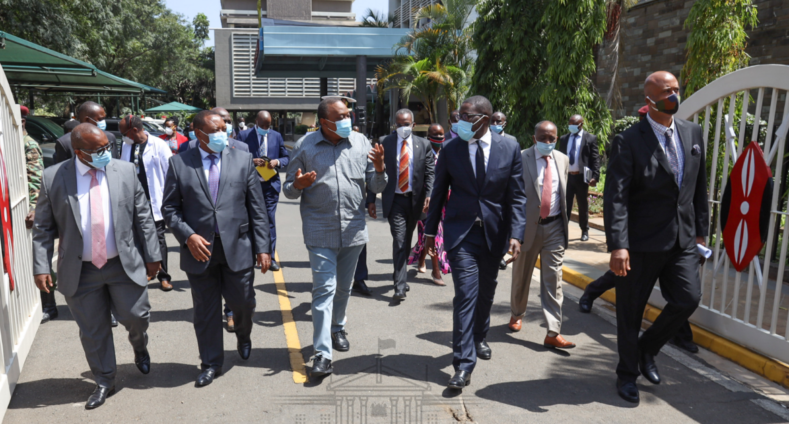Kenya’s top judge advised President Uhuru Kenyatta on Monday to dissolve the country’s male-dominated parliament, saying lawmakers had failed to meet a constitutional provision which would allow for one-third of seats to be occupied by women.
Despite Kenya’s 2010 constitution stating that no more than two-thirds of any elected or appointed body can be of the same gender, women hold 22% of seats in the country’s lower house of parliament, and 31% in the upper house.
Court rulings since 2012 have directed parliament to pass legislation to enforce the gender rule or risk being dissolved - but previous attempts have failed with female MPs accusing male lawmakers of deliberately blocking efforts.
In an advisory sent to Kenyatta, Chief Justice David Maraga said the failure to enact the legislation was clear testimony of lawmakers’ “lackadaisical attitude and conduct” in relation to the two-thirds gender rule.
“There is no doubt that the dissolution of parliament will cause inconvenience and even economic hardship. The fact that Kenya is in the midst of the coronavirus pandemic only exacerbates the potential impact of the decision,” wrote Maraga.
“Yet that is the clear result Kenyans desired for parliament’s failure to enact legislation they deemed necessary. We must forget that more often than not, there is no gain without pain.”
Presidential spokeswoman Kanze Dena told the Thomson Reuters Foundation that there was no comment on the advisory.
Some political analysts said the advisory does not compel the president to act, but women’s rights groups who have long campaigned for legislation said the move was a significant step in the fight for fairer gender representation in politics.
“We imagined it, we worked for it we made it possible,” tweeted Marilyn Kamaru from the #Weare52pc movement, a collective of activists and womens’ groups which had petitioned to have parliament dissolved three years ago.
“Whether the president dissolves parliament or illegally retains it in violation of the Constitution. It is important to remember this moment was made possible by the work of women activists, feminists & the queer community.”
Women make up only a third of the 2.5 million people employed in the formal sector, according to the Kenya National Bureau of Statistics. And while women provide 80% of Kenya’s farm labour, they own only 1% of agricultural land.
The percentage of women in Kenya’s parliament is lower than east African neighbours such as Ethiopia, South Sudan, Burundi and Rwanda, according to Inter-Parliamentary Union.
Gender experts say women in politics face a barrage of challenges, ranging from physical and sexual violence to a lack of money to fund their campaigns. Quotas, they say, help create a more level playing field and ensure their voice is represented.
Latest Stories
-
GoldBod issues final warning: No extension beyond June 21 for unlicensed gold traders
12 minutes -
Vietnam scraps two-child policy amid falling birth rate
25 minutes -
NDC to rename party HQ ‘Jerry Rawlings House’
28 minutes -
EU Commission gives Bulgaria green light to use euro
36 minutes -
Ghana must push innovation beyond academia – Researchers told
37 minutes -
Fighting corruption will solve over 90% of Ghana’s problems – NDPC
47 minutes -
Today’s Front pages :Thursday, June 5,2025
52 minutes -
The real value of the cedi is between GH¢10 and GH¢12 – Mahama
52 minutes -
NYA boss Osman Ayariga enrolls June 3rd survivor in National Apprenticeship Programme
2 hours -
Beyond the D and E-levies: Why Ghana deserves honest economic policy conversations
2 hours -
Ivory Coast’s final electoral list excludes opposition leader Thiam
2 hours -
Notorious armed robber jailed 18 years for robbery
2 hours -
I delivered all monies to NSB office, not Adu-Boahene’s home – AG witness
2 hours -
Man lynched to death over alleged mobile phone theft in Agbozume
3 hours -
Aquatic weeds are threats to hydro power, water transport – Maritime Authority
3 hours

